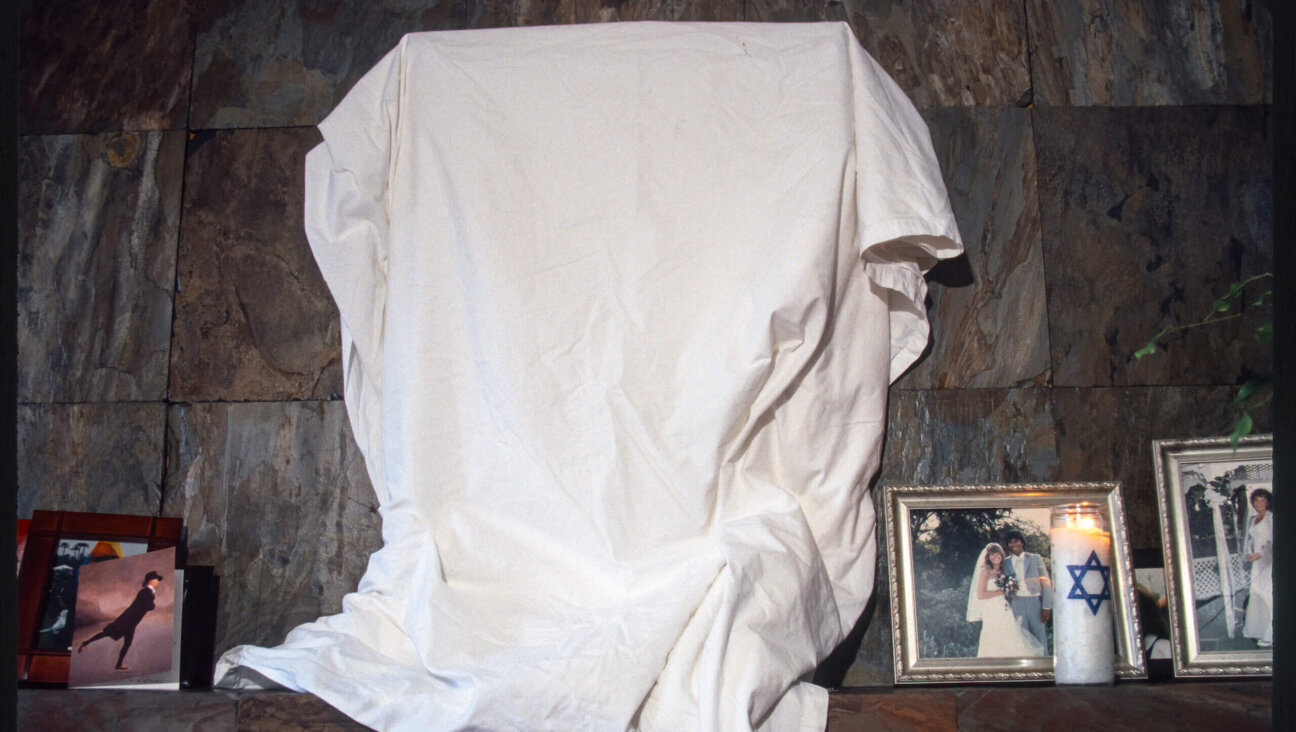Just Say ‘Nu?’: Nu!
Among the best-known words in the language, nu is sometimes heard in English these days, but rarely among non-Jews and never with the vast range of meaning that it can have in Yiddish. Things have changed considerably since 1958 or ’59 when I went tearing out of the room where I’d been watching “December Bride” in order to inform my mother that Pete Porter, one of the regular characters, had to be Jewish. Pete was played by Harry Morgan (who was also Bill Gannon on Dragnet and Colonel Potter on “MASH”), and anyone who’s seen the show will remember that its characters were among the most irredeemably goyish in an era of irredeemably *goyisheh sitcoms. My mother, ever the diplomat, asked me how I knew. “Er hot nor voos gezugt nu,” I told her. “He just said nu.” My mother didn’t miss a beat. “Iz nu?” she asked, as if to say, “And what? He shouldn’t say nu?”
Nu is that kind of word. According to Uriel Weinreich, nu means “Go on! well? come on!” And it does. But it can mean so very much more, depending on context and tone of voice.
At its most colorless, nu can be used to link two disparate elements in a conversation, as when you want to change from one subject to another and can’t think of a smooth transition, or want to resume speaking after a long silence, comfortable or not. In a sentence like,
…IN IZ PLItsim geSHTORBM. NU, LOmeer RAIDN FIN FRAYlekhereh ZAKHN.
…and died suddenly. Nu, let’s speak of happier matters,
the happy matter could be a Mets victory or a warmer day than you’d expect for November; the point is that the nu gets you out of any topic that’s become unpleasant, uncomfortable, or uninteresting and serves as a magic bridge to whatever you’d like to discuss next. You could just as easily say:
…IN IZ PLItsim geSHTORBM. NU, IKH HOB NEKHTN OOPgeFRAIGT EINSTEIN’S taiORyeh
…and died suddenly. Nu, I disproved Einstein’s theory yesterday,
as go on to a eulogy of the deceased. A nu of this type must follow seamlessly from the preceding word, as if it’s merely the final syllable: ge-SHTORBM-NU. (The bold type above is intended as an aid to nu-location; it has nothing to do with accent or stress.)
This sort of nu is closely related to the “Let’s stick to the matter at hand” nu, as seen in such phrases as NU, VOOS VET ZEIN?
Nu, what’s going to be?
or
NU, raBOYsei
Nu, gentlemen.
These are used in order to get things back on track (at a meeting, for instance) after some digression in the proceedings. They mean, “That’s all well and good, but what about the main point”; or, “Leaving aside everything that’s been raised hitherto, let’s return to the central question of…”
Nu, raboysei can also be used as a way of calling a group of people to order or getting a meeting or assembly under way. It’s a more refined way of clearing your throat or saying, “Let’s cut the crap and get down to business.”
Nu can also be used on its own as a way of opening and even sustaining a conversation. You can approach a Yiddish-speaking stranger almost anywhere and simply say,
NU-U-U?
Translated briefly, this would mean, “What are you doing here and what have you got to say for yourself?” Such an introduction could theoretically lead to the following exchange:
Them: NU!?
What business is it of yours and who are you that you should even be asking?
You: NU!!
I demand an answer!
Them: IZ NU?
Is that a fact?
At which point the other person turns on her heel and leaves. Although such a conversation is possible (and when dealing with “life of the party” types, all too probable), there’s a general feeling that two unaccompanied nus in succession are more than enough for any conversation.
The iz nu with which the above exchange ends is, of course, exactly what my mother said on hearing that Pete Porter was Jewish. Context determines the precise meaning of the phrase. When my mother used it, she meant, “What else should he have said? Tell me something surprising.” Immediately above, it means, “I know that you want an answer and I don’t care one little bit.” In short, “So what?” It can be a friendly “so what,” as in “That’s exactly what I would have expected,” or a hostile “so what,” as in, “tough noogies”:
You: DER NAZI HOT geRAIT VEE AN ANtee-seMIT
The Nazi spoke like an anti-Semite
Them: IZ NU?
And?…
or
You: MEER geFELT NISHT DEIN ARbet.
I don’t like your work.
Them: IZ NU?
So what’s it to me?
This usage shades almost imperceptibly into the nu of utter indifference, the “is that supposed to be of any interest” nu:
Sam Spade: IKH HOB geZAIN JOEL CAIRO HEINT BEI NAKHT.
I saw Joel Cairo tonight.
Miss O’Shaughnessy: NU?
So?
Nu can also be used to preface a question with which you’d like to begin a conversation:
NU, VOOS MAKHT A YEED?
Nu, how’s a Jew?
is like saying, “So how’s it going?” in English. The nu, like the so, helps to soften the question and indicate an openness to further conversation. It’s as if you’re saying, “Ah, there you are. I’ve been wondering about you lately.”
The nu of impatience is among the most prominent of all the nus, and is probably the most frequently heard. It starts with a simple
NU-U-U?
Come on,
delivered in a tone midway between quizzical and chagrined, as if to say, “If you don’t know what the gas pedal is there for, how did you get so far in this traffic to start with?” It’s a “poop or get off the pot” sort of thing. Nu here means “either do it or don’t do it, but make a decision and let us know”:
KIMST TSEE NISHT? NU?
Are you coming or not? Make up your mind, commit yourself to one course of action or the other.
The next step up from the simple nu of impatience involves linking nu with another of the five most useful Yiddish words, shoyn:
NU, SHOYN?
Come on, already.
Imagine an old movie, one of those where the bad guy, secure about the good guy’s goodness, hands him his gun and says, “Go ahead, then, shoot me. Right here, in cold blood. Here, go ahead and shoot.” If the movie were in Yiddish, the next line, the one right before, “Can’t do it, can you? I didn’t think you could,” would be
NU, SHOYN?
Whatever it is, just do it already.
It should therefore come as no surprise that
NU, GAY SHOYN
Come on, go already,
is a favorite of Yiddish-speaking drivers the world over, or that no Nike commercial will ever be translated into Yiddish. “Just do it” runs the marathons that its translation, nu shoyn, never would.
Nu shoyn differs slightly from the closely related nu-zhe, which is a little less forthcoming, a little more beseeching. In the scenario just described,
NU-ZHE
would have more the sense of “Please shoot and put me out my misery” than “I double-dog dare you.” Otherwise, it’s more along the lines of “Nu, please,” than the overtly imperative nu shoyn.
Nu can also indicate that things have come to an end, even when those things are only your patience.
NU, LOmeer GAYN
Nu, let’s go
can mean either, “Oh, have we finished? Then let’s be on our way,” or “Okay. That’s it! I can’t take any more. Let’s go.” You could also use it if you and a friend were suddenly to be given an invitation to a party; in such a case, nu would have a sense very like that of “okay.”
Nu can even be used to mean “if.” If a friend is afraid that her ex-husband might show up at some social event to which she’s been invited, you can say,
NU, AZ ER KIMT IZ VOOS [best pronounced here as VOO-es for the sake of contemptuous emphasis]?
And if he comes, so what?
Without the nu, the sentence wouldn’t have so strong a sense of “so what, it doesn’t matter.” If you ask a kid, or a roomful of kids, “Want candy?” expect to hear a response of
NU, YEH!
We sure do!
This is a highly developed form of the “what else?” motif that we saw earlier and leads to the truly wonderful
POter NU
absolutely, undoubtedly, no question about it.
It’s a response—arguably the best possible response—to a ridiculously obvious question. “Mr. Wex, do you know any members of the Jewish faith?” “Poter nu!” While the basic meaning of poter is “exempt from, free,” -here it means “of course, absolutely, for sure.” Poter nu is really poter; nu? “Of course, why would you even think to ask?”
I’ve also been told that in many a marriage, a late night, slightly diffident
NU?
often accompanied by a shrug (and usually uttered by the husband), is still considered foreplay. In other bedrooms, of course, the nu of impatience is used.
Adapted from “Just Say Nu,” by Michael Wex. Copyright (c) 2007 by the author and reprinted by permission of St. Martin’s Press.























